The 71st Cannes Film Festival is under way (May 8-19), and along with fellow critic Kenneth Turan and movie writer Amy Kaufman, L.A. Times critic Justin Chang is on the ground, taking in the scene and seeing as many movies as possible in between frequent steak tartare breaks. Early titles gaining buzz this year include Spike Lee’s “BlacKkKlansman” and “The House That Jack Built,” Lars von Trier’s first film to compete at the festival since he was banned in 2011. In this day-by-day, film-by-film diary, he gives us an up-close view of the most significant event in world cinema, a mecca for movie lovers.
- Share via
Cannes notebook: The wonderful, improbable Palme d’Or triumph of Hirokazu Kore-eda’s ‘Shoplifters’
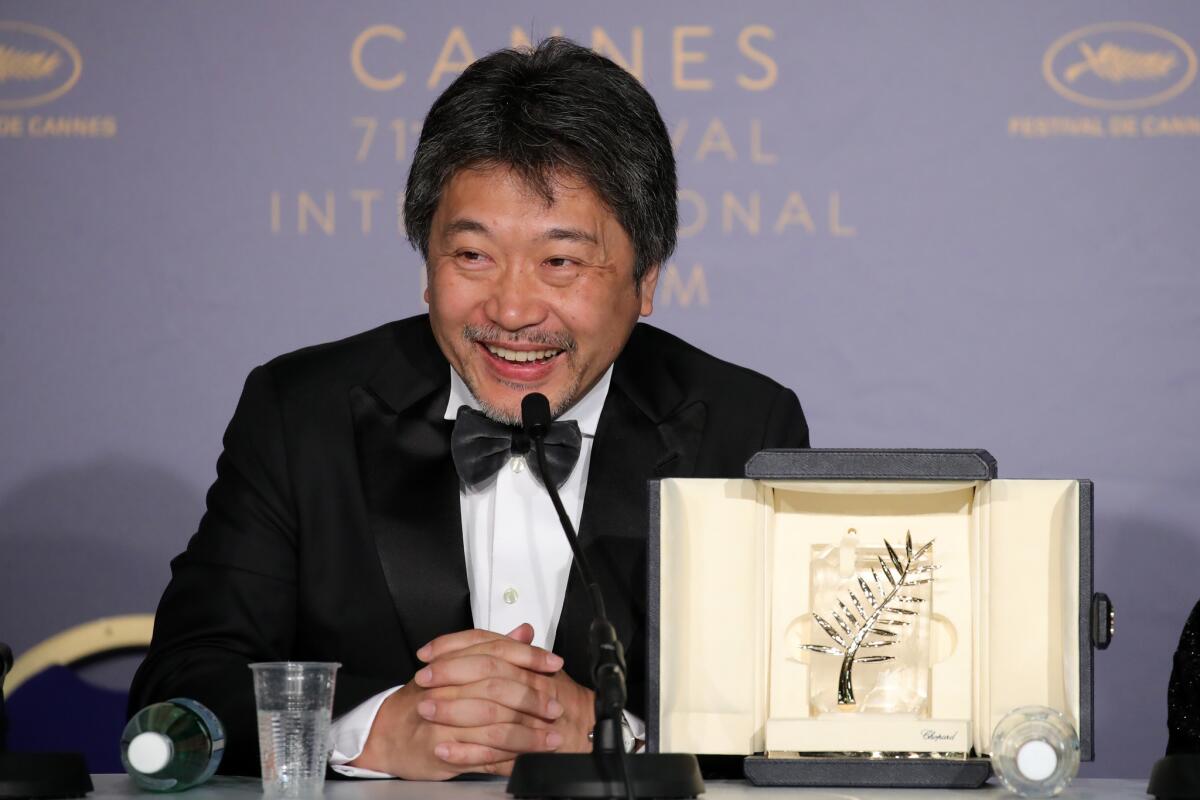
On the last day of every Cannes Film Festival, word begins to leak out about which filmmakers from the competition have been called back for the closing-night awards ceremony.
Many of us already knew, going into Saturday night’s show, that Pawel Pawlikowski’s “Cold War,” Alice Rohrwacher’s “Happy as Lazzaro,” Spike Lee’s “BlacKkKlansman,” Nadine Labaki’s “Capernaum” and Hirokazu Kore-eda’s “Shoplifters” were certain to go home with awards, though which film would win what remained a mystery.
Festival juries are notoriously difficult to predict, but several other critics shared my hunch that the Palme d’Or, the festival’s top prize, would go to either “Capernaum” or “BlacKkKlansman.” Both were among the most enthusiastically touted films in the competition, and they offered the jury a chance to anoint either Labaki, a Lebanese director who had just launched herself into the big leagues, or Lee, a veteran American auteur who had famously (and angrily) lost the Palme nearly 30 years ago for “Do the Right Thing.” Would they go with the striking new talent or the overdue veteran?
In the end, they chose the overdue veteran, though not the one some of us were expecting. In a development as startling as it was altogether marvelous, the jury president, Cate Blanchett, announced that the Palme d’Or had gone to Kore-eda’s “Shoplifters,” one of the quietest, loveliest and most emotionally enduring films in the competition.
Did anyone see this coming? To judge by his genially shell-shocked reaction, Kore-eda himself certainly didn’t.
- Share via
Day 12: Terry Gilliam gets his long-overdue moment with ‘The Man Who Killed Don Quixote’ at Cannes
Closing-night films at festivals are often dismal, forgettable affairs, and Cannes’ track record has been no exception. (If you remember “Ice and the Sky” or have fond memories of “What Just Happened,” I stand corrected.) In the last two years, the festival has opted to forego an official closing-night film entirely, instead simply replaying the Palme d’Or-winning title after the awards ceremony.
And so there were reasons for the heart to sink at the news that “The Man Who Killed Don Quixote,” Terry Gilliam’s endlessly embattled, decades-in-the-making riff on the Miguel de Cervantes classic, had been selected to bring down the curtain on the 71st Festival de Cannes.
At the same time, the momentous nature of the occasion was cause for legitimate, if queasy, excitement. Even if the Curse of the Closing-Night Film persisted and the film turned out to be awful, surely the satisfaction of seeing Gilliam’s long-delayed dream project finally completed would provide a measure of catharsis, closure in more than one sense.
- Share via
Day 10: Cannes delivers a triumph with Lee Chang-dong’s slow-‘Burning’ masterwork
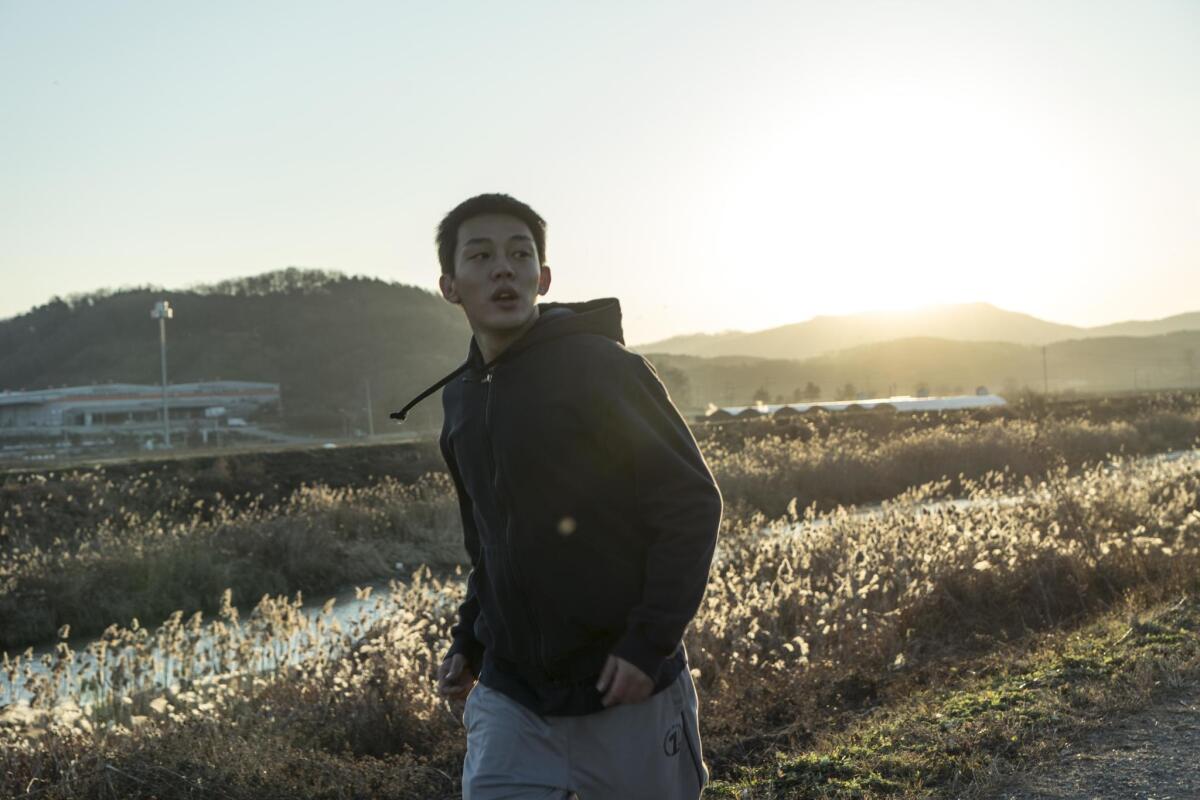
Before the 71st Festival de Cannes had even begun, the word on the Croisette — that storied boulevard that winds its way along the beach through this small French Riviera town — was that we were in for the weakest lineup in recent memory. Abandoned by Netflix, devoid of Oscar bait and attended by just a handful of Hollywood stars, the grande dame of film festivals was clearly flailing with a slate of movies from a bunch of international filmmakers you’ve never heard of and couldn’t possibly be interested in getting acquainted with.
As a Los Angeles-based critic, I try to maintain an even temper about the persistent American Cinema First attitude — call it cultural incuriosity at best, outright xenophobia at worst — that poisons much of the so-called discourse around our movies.
Cutting-edge world cinema may be this festival’s true raison d’être, but it has always needed a delicate balance of blockbusters (like this year’s “Solo: A Star Wars Story”) and English-language awards contenders in order to survive, thrive and attract media attention. In a film industry subject to enormous financial and technological change, that need may be stronger than ever.
Even still, declaring a festival lineup worthless is something best done after you’ve seen a number of the films and found them wanting, not before. And with this year’s Cannes now more than halfway over, I feel confident in saying that, far from being the worst, it strikes me as one of the stronger, more robustly surprising slates in recent memory, provided that filmmakers with names like Jafar Panahi, Hirokazu Kore-eda, Jia Zhangke and Bi Gan don’t send you screaming from the theater.
- Share via
Day 8: Lars von Trier’s ‘The House That Jack Built’ and Spike Lee’s ‘BlacKkKlansman’ make for a night of provocation
They really will applaud anything you show at the Cannes Film Festival, so long as you put everyone in formal attire and roll out a red carpet beforehand.
I remember thinking this in 2009, at the black-tie gala premiere of Lars von Trier’s “Antichrist,” whose climactic burst of genital-shredding imagery sent horrified moviegoers lunging for the exits. Nonetheless, when it was over, the movie drew a standing ovation and shouts of “Bravo!” among the many who chose to stay for the duration.
A similar mix of mid-screening walkouts and post-screening applause greeted von Trier’s “The House That Jack Built,” the hectoring, masturbatory slog of a serial-killer movie that had its out-of-competition premiere at Cannes late Monday night, marking this Danish director’s long-awaited, long-dreaded return to a festival that seven years ago declared him “persona non grata.”
Von Trier stood there quietly in the Grand Théâtre Lumière when it was over, smiling a thin, inscrutable little smile and basking in his moment of redemption, or perhaps savoring the irony that it had arrived with the least redemptive anti-entertainment of his career.
- Share via
Day 7: A look at early favorites as the festival reaches the halfway mark
With the 71st annual Cannes Film Festival officially at the midway point, film critics Justin Chang and Kenneth Turan share their early favorites from the festival and thoughts on what makes Cannes unique.
- Share via
Day 6: Fighting the patriarchy with Jafar Panahi’s ‘3 Faces’ and Eva Husson’s ‘Girls of the Sun’
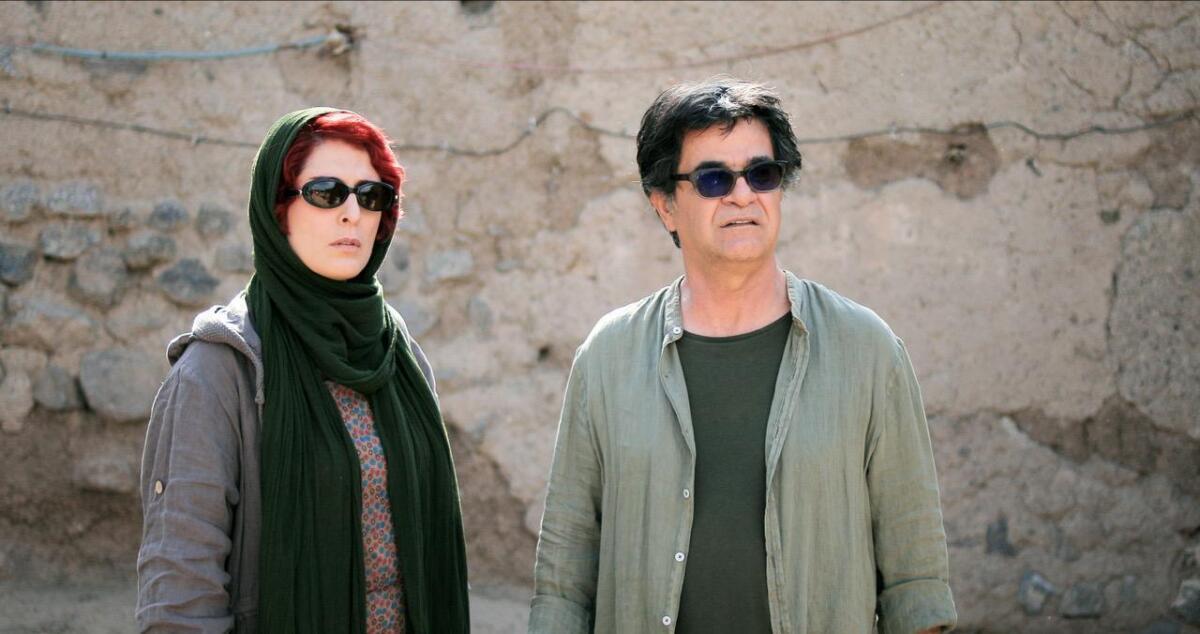
I saw a beautiful movie at Cannes on Saturday night — an artful, surprising and thrillingly intelligent story about a few women trying to make a difference, forging bonds of solidarity in quiet defiance of the repressive, small-minded men in their rural village. That movie is “3 Faces,” the latest from the ever-resourceful Iranian writer-director Jafar Panahi, who has been restricted from traveling abroad by his country’s government and so was unable to attend his film’s festival premiere.
This has become fairly routine for Panahi, who was arrested in 2010 for allegedly making anti-Islamic propaganda and was sentenced to a 20-year ban from filmmaking. That hasn’t stopped him, of course: While under house arrest, he shot the feature-length video diary “This Is Not a Film,” which was smuggled out of Iran on a flash drive hidden inside a cake and premiered to deserved acclaim at Cannes in 2011. Panahi also appeared as himself (or a version thereof) in his next two pictures, “Closed Curtain” (2013) and “Taxi” (2015), both of which screened at the Berlin International Film Festival.
“3 Faces” marks Panahi’s first shot at the Palme d’Or; if he wins, he will have effectively scored the European film-festival equivalent of the Triple Crown.
- Share via
Day 5: Passion and politics merge in the exquisite doomed romances of ‘Ash Is Purest White,’ ‘Cold War’
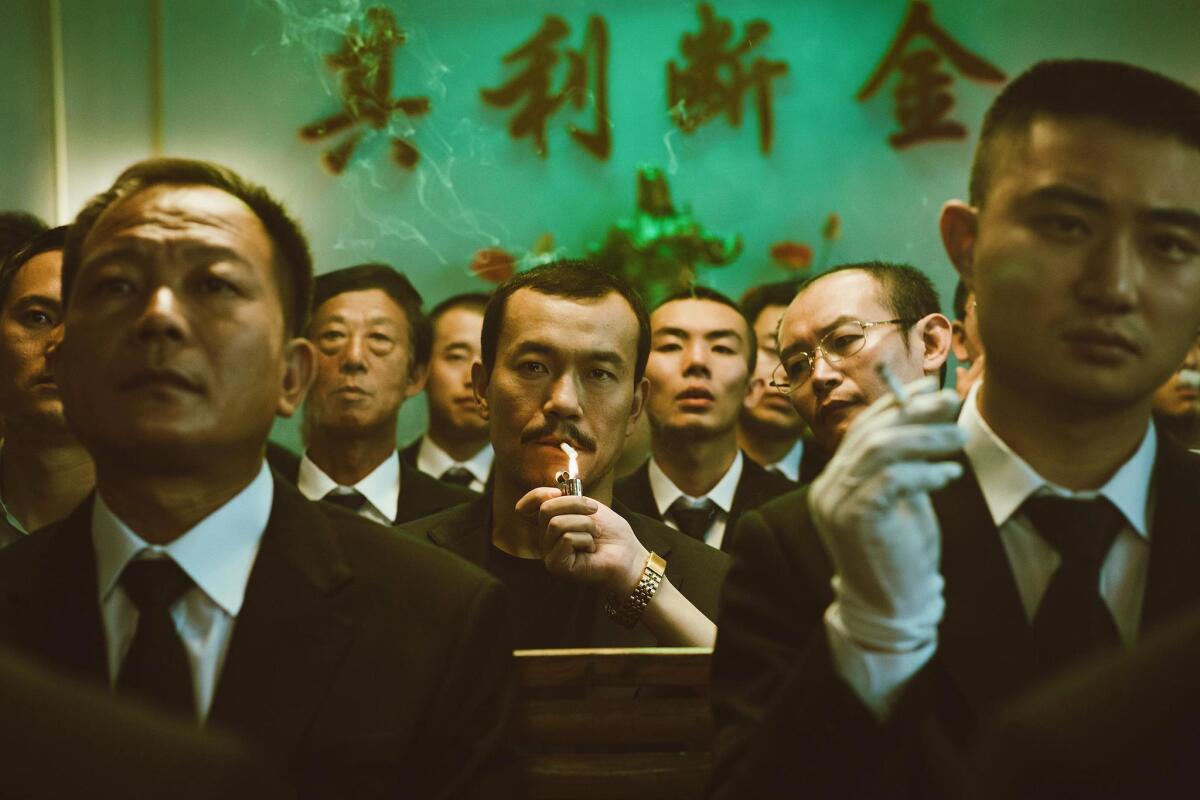
After a slow start, the 71st Cannes Film Festival has found its footing with two early Palme d’Or contenders, “Ash Is Purest White” and “Cold War” (“Zimna Wojna”). Although these films could scarcely be more different in form and feel — one is sprawling and expansive, the other taut and precise — each is a story of thwarted yet oddly resilient love, as well as a beautiful marriage of the political and the personal.
That particular synthesis is nothing new for Jia Zhangke, the revered Chinese writer-director whose work brings the chaos of life in his rapidly evolving country into hyper-crisp digital focus. In “Ash Is Purest White,” he subtly distills nearly two decades of gradual social change into the story of a small-town gangster and his moll. The movie opens in 2001, in the northern village of Datong, where Guo Bin (Liao Fan), a member of the jianghu underworld, runs a mah-jongg parlor and enjoys the sycophantic attention of his comrades and underlings.
- Share via
Day 3: Russian drama takes the stage at Cannes in the sweet ‘Leto’ and the scathing ‘Donbass’
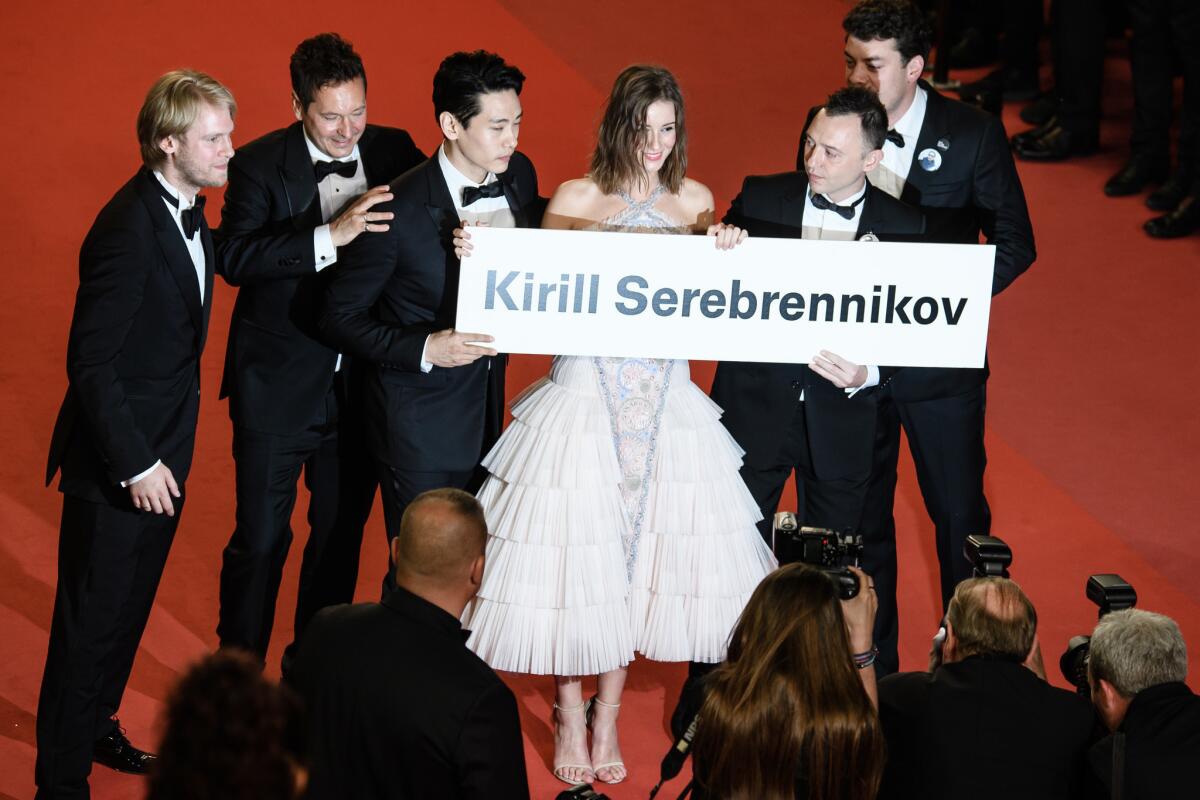
Russia and Iran are never far from the news these days, but recently they have made headlines in Cannes for the same dubious reason. Both countries have filmmakers represented in the festival’s prestigious competition, and both have refused to allow those filmmakers to attend.
To be clear: The Iranian writer-director Asghar Farhadi had no difficulty traveling to Cannes for the opening-night premiere of his new film, “Everybody Knows.” But at his news conference, Farhadi expressed sorrow and unease at the plight of his countryman Jafar Panahi, who in films like “The Circle” and “Offside” has been a consistently sharp critic of Iran’s social policies. Panahi was arrested in 2011 and has not been allowed to travel abroad since; unless some form of amnesty is granted, he will not be in Cannes for the unveiling of his competition entry, “3 Faces.”
While the specific circumstances are different, Panahi’s plight eerily mirrors that of the Russian stage and screen director Kirill Serebrennikov (“Betrayal,” “The Student”), who in 2017 was detained and accused of fraud and embezzlement. His many allies in the artistic community contend that the charges are phony and politically motivated, likely in response to Serebrennikov’s criticism of Russia for annexing Crimea in 2014, as well as his support of Russia’s LGBT community. (Among the artists who have called for the charges to be dropped: Cate Blanchett, the president of this year’s Cannes competition jury.)
And so when Serebrennikov’s “Leto” premiered in competition on Wednesday night, its 48-year-old director was represented only by a sign bearing his name, carried by his collaborators as they walked up the red carpet and made their way into the Grand Théâtre Lumière.
- Share via
Day 2: Cannes kicks off with two Spanish-language dramas, ‘Everybody Knows’ and ‘Birds of Passage’
You truly don’t know what it means to suffer until you’re a journalist covering the Cannes Film Festival. Jet lag, spotty Wi-Fi, a beautiful beach you never have time to visit, that croque-monsieur that smelled kinda funny — it’s the worst, I tell you.
But this year really takes the cake. This year, the 71-year-old festival finally did away with its long-standing tradition of holding advance press screenings for films playing in the main competition. Going forward, those press screenings will be held either concurrent with or after the film’s public gala screening, robbing journalists of their early access.
What this means, practically speaking, is that no film — and especially no bad film — will have to endure the indignity of being booed, dismissed and analyzed to death by the media before the filmmakers have been able to enjoy their glorious moment in the Grand Théatre Lumière’s spotlight. Now, whenever a piece of red-carpet bait as dreadful as Gus Van Sant’s “The Sea of Trees” or Sean Penn’s “The Last Face” premieres in competition, festival-goers will be able to don their formalwear and march off to the gala screening at least theoretically unaware of the cinematic horrors that await them.
- Share via
Stubborn? Arrogant? Irrelevant? The 2018 Cannes Film Festival weathers the storm on Day 1
In May 1968, Jean-Luc Godard and a few of his French New Wave contemporaries famously brought the Festival de Cannes to a halt, an act of solidarity with striking students and workers who were taking France by storm.
Fifty years later, Godard still looms large at Cannes, quite literally. The official poster for the 71st festival is graced with the immortal image of Jean-Paul Belmondo and Anna Karina kissing in the director’s 1965 classic, “Pierrot le Fou.” This year, the 87-year-old Godard will likely limit his disruptive gestures to the unveiling of his new movie, “The Image Book,” which promises to shake up the main competition; it’s said to be a characteristically unorthodox reflection on the modern Arab world.
The festival itself, which opened Tuesday night with the world premiere of Asghar Farhadi’s “Everybody Knows,” shows no signs of coming to a premature conclusion, though there are some who probably wish it would. In my own previous 12 years of attending, I can’t remember the last time Cannes commenced under such a cloud of grumbling, suspicion and all-around anxiety or any time the festival took such a widespread beating in the media before it even had a chance to roll out its famous (if now selfie-free) red carpet.